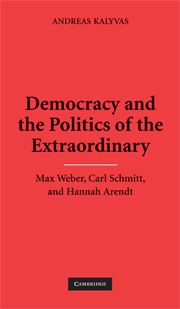Book contents
- Frontmatter
- Contents
- Acknowledgments
- List of Abbreviations
- Introduction: The Extraordinary and Political Theory
- I CHARISMATIC POLITICS AND THE SYMBOLIC FOUNDATIONS OF POWER
- II THE EXCEPTION AND CONSTITUTIONAL POLITICS
- III TAMING THE EXTRAORDINARY
- Conclusion: A Democratic Theory of the Extraordinary
- Bibliography
- Index
III - TAMING THE EXTRAORDINARY
Published online by Cambridge University Press: 04 August 2010
- Frontmatter
- Contents
- Acknowledgments
- List of Abbreviations
- Introduction: The Extraordinary and Political Theory
- I CHARISMATIC POLITICS AND THE SYMBOLIC FOUNDATIONS OF POWER
- II THE EXCEPTION AND CONSTITUTIONAL POLITICS
- III TAMING THE EXTRAORDINARY
- Conclusion: A Democratic Theory of the Extraordinary
- Bibliography
- Index
Summary
Freedom [is present here], inasmuch as a new beginning has to be made.
Johann Gottlieb FichteCe qui est légal, c'est ce qui est la Révolution, en sorte que, traitant de la Révolution, je m' assois sur la base, sur la pierre fondamentale des lois. Il ne faut pas dire: la Révolution, mais la fondation.
Jules MicheletHannah Arendt is one of the most studied and cited authors today. Her major writings are virtual classics. Her theory of totalitarianism, her agonistic reconceptualization of action, her late preoccupation with reflective judgment, and her understanding of the crucial role of narratives and storytelling have increasingly dominated our understanding of her work. Likewise, themes related to her intellectual relationship to Martin Heidegger, her alleged proximity to deconstructionism and postmodernism, and her communicative theory of politics have provided new interpretative prisms, substantially contributing to a renewal and reconfiguration of Arendt studies. This revival, however, has neglected her writings on revolution and new political beginnings. As a consequence, her rich reflections on the politics of the extraordinary remain, with a few scattered exceptions, relatively marginal and overlooked. This neglect has been explained by Dana Villa's claim that a focus on founding acts “hypostatizes the moment of foundation as the paradigm of initiatory action. To some extent, Arendt shares the blame: her analysis in On Revolution tends to focus on founding as the political practice par excellence.” This dismissal reflects a broader trend in Arendt scholarship that is gradually moving away from the political qualities of her writings.
- Type
- Chapter
- Information
- Democracy and the Politics of the ExtraordinaryMax Weber, Carl Schmitt, and Hannah Arendt, pp. 187 - 193Publisher: Cambridge University PressPrint publication year: 2008
- 1
- Cited by



